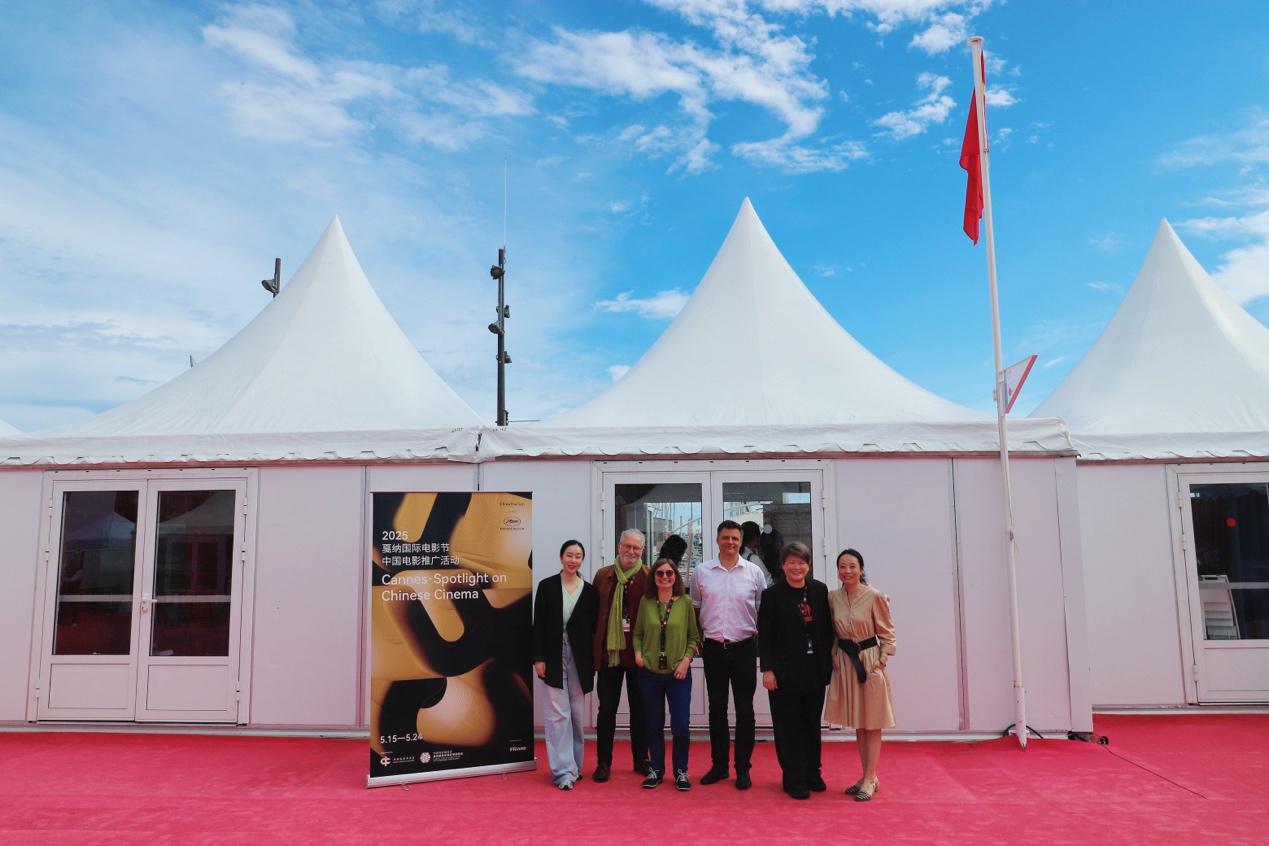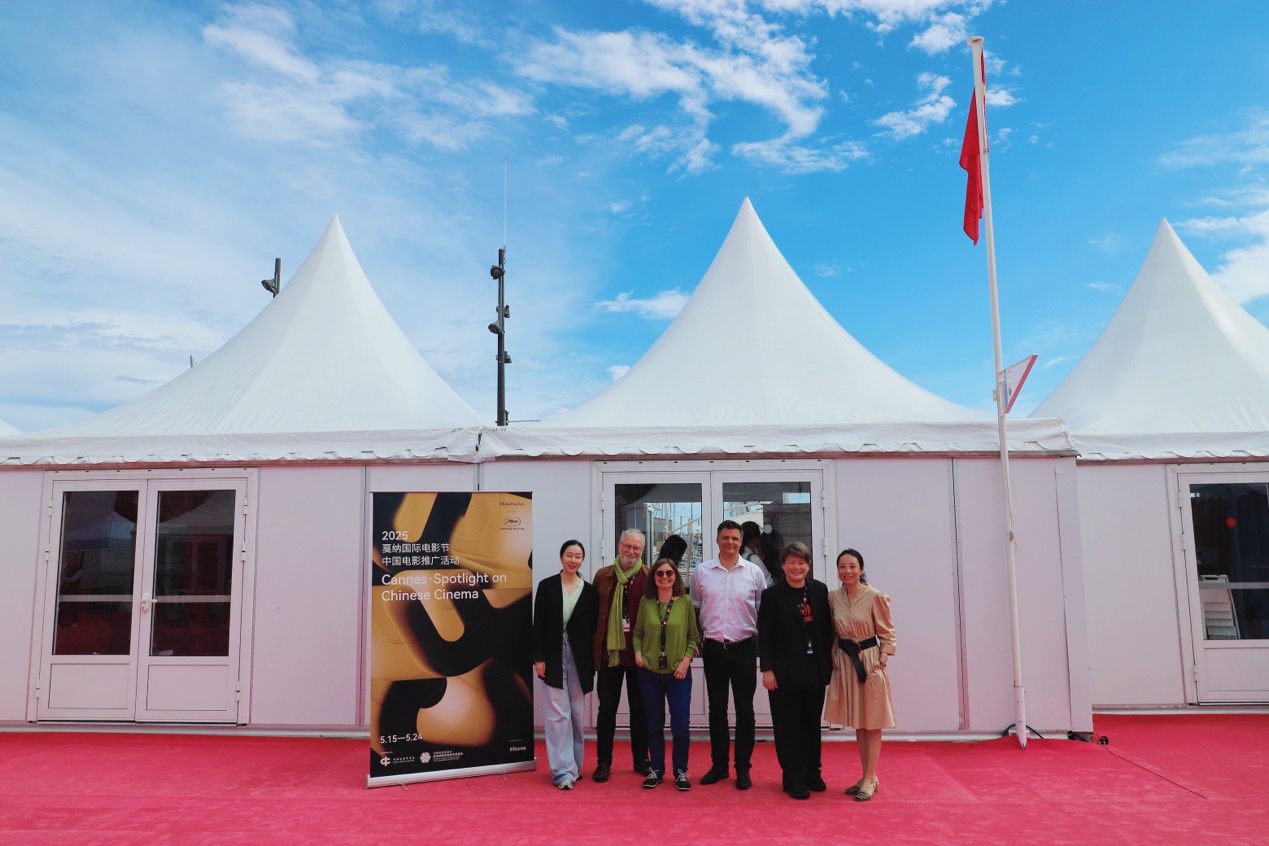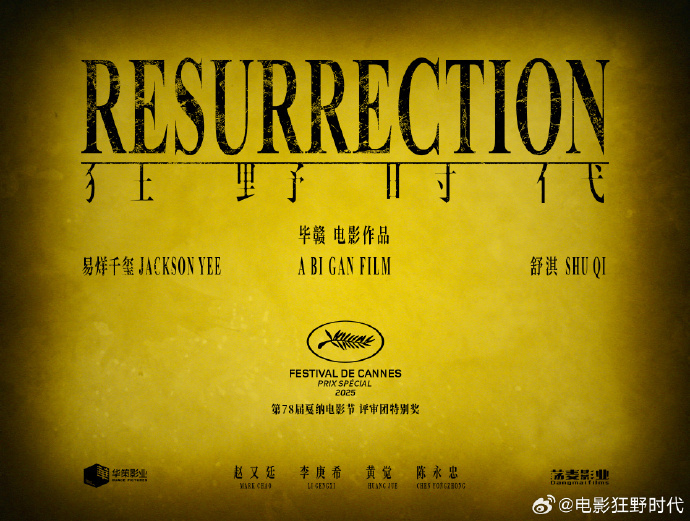
From May 15 to 22, French time, a series of theme exchanges and roundtables held in the China Pavilion of the International Village of the Cannes Film Festival came to a successful conclusion. Filmmakers from different fields at home and abroad gathered here to exchange ideas in the interaction between Chinese and world films, feel the contemporary vitality of the ever-evolving oriental light and shadow, and explore its development possibilities in the context of world cinema.

Guests take a group photo in front of the China Pavilion at the International Village of the Cannes Film Festival
Youth’s self-expression builds the future of world cinema
Young filmmakers are still the focus of this year's China Pavilion. At the roundtable meeting on "How Young Filmmakers Enter the International Stage" held on May 18, Jiao Xiongping, a well-known film scholar, screenwriter, and producer, shared his own experience on how young filmmakers can go international, that is, starting from cultural identity and paying real attention to local culture, constantly bringing such voices to the international platform, forming their own discourse and network, so that the international film industry can truly hear the voices of Chinese filmmakers.
The exchange meeting "Young Filmmakers' Creative Talk: The 'Younger' Telling of Chinese Stories and Its Possibilities" held on May 19 invited Yu Shi, the recommender of the Youth Film Global Promotion Program, and the three shortlisted young directors Jing Yi, Huang Qiling, and Zhu Xin to share their creative experiences.
Yu Shi said, "There are many outstanding young filmmakers in China, and there are even more outstanding Chinese stories and expressions from the perspective of young Chinese people. We hope that more people will see them." He talked about how his generation's expressions should be rooted in the background of the times and tell real Chinese stories from a "young" perspective. He believes that the advantage of contemporary youth creation is that they are "in the midst of it", and they do not need to deliberately cater to the group, but naturally present the characteristics of the times.

"Young Filmmakers' Talk: The 'Younger' Way of Telling Chinese Stories and Its Possibilities" Exchange Meeting
Filmmakers around the world discuss "Nezha"
At the themed exchange meeting on "Setting Sail and Opening the Door to Welcome Guests: Talks on the Successful Experiences of Chinese and Foreign Film Distribution in a 'Two-Way'" held in the China Pavilion on May 20, the guests discussed the impact of Chinese films entering the era of single-film box office of 10 billion yuan on the Chinese film market, starting from "Nezha: The Devil Child Conquers the Dragon King".
In the view of Jean-Michel Frodo, a well-known French film journalist and critic, the international visibility of Chinese films has been rising over the past 40 years. "Nezha: The Devil Boy Conquers the Dragon King" represents a phenomenal success and a reflection on the diversity of the film industry based on this. Joyce Lee, founder and producer of Encore Films, which mainly distributes films in Southeast Asia, affirmed the overseas distribution performance of "Nezha: The Devil Boy Conquers the Dragon King", which broke the long-standing distribution monopoly of Hollywood films in the Southeast Asian market, triggered unprecedented audience viewing behavior, and played a role in rescuing the market from the operating difficulties of theaters, especially IMAX theaters.
Boris Pugnet, partner of Heylight in France and senior film distributor, shared the release of "The Second Part of the Gods: The Battle of Xiqi", how to use effective publicity to create a word-of-mouth effect during the release of this film, and the role of regionally targeted promotional materials on the audience and the box office of the film. Taking French audiences as an example, art films and Hollywood blockbusters are equally popular, but for Chinese films, the art route is smoother than the commercial blockbuster route. Luisa Prudentino, a sinologist and Chinese film expert, started from the diversity and individuality of young directors today, analyzing their creative methods that combine tradition and modernity, which make them emphasize individual expression rather than collective style. At the same time, it is important for Chinese filmmakers to reflect real life and find inspiration from their own experience.
Based on overseas distribution experience, mastering international narratives is an important way for Chinese films to achieve cross-border dissemination. The emphasis on international distribution and the production of localized materials for audiences in different regions can also help films successfully go overseas.
Traveling around China through movies and building a global communication context
The "Follow Movies to Travel Around China" themed exchange meeting held on May 15, launched by the State Administration of Press, Publication, Radio, Film and Television and China Media Group, introduced the development history of the China Pavilion and its role as a window for film and cultural exchanges between China and the world to filmmakers from home and abroad who attended the event. It also explained, based on the achievements made by Chinese films at different stages of development, that "high-quality content, international cooperation and strategic communication have broken down cultural barriers, allowing the combination of traditional Chinese cultural elements and modern technology to become an emotional bond connecting global audiences."
Jiao Hongfen, chairman of the China Film Producers Association, said: "Movies are a form of visual tourism. Understanding a country, a nation, the life of its people, and expressing people's emotions through movies is a very international expression." Producer Liang Jing started from the production stories of films such as "Bullfighting", "Eight Hundred", and "Dongji Island" to share practical cases of using a movie to drive local cultural and tourism construction.
At the same time, Donna, a famous American producer, and Philippe, a famous French director, shared their experiences in making "Crouching Tiger, Hidden Dragon" and "The Nightingale" respectively, and shared their understanding of the beauty of China's mountains and rivers through movies. They also encouraged more people to shoot films in China, so that more audiences can travel around China through movies.

"Traveling around China with Movies" event site


